Postcode check: How's the NHS coping in your area?published at 11:03 GMT 14 March 2024
As the NHS enters 2024 and a difficult winter period, find out what's happening in your area.
Read MoreOur live coverage has come to an end
During a special day of coverage, we reported on the pressures faced by NHS patients, doctors and nurses
BBC South East was given exclusive access to South East Coast Ambulance Service and Maidstone Hospital
We had teams at healthcare settings across Kent, Sussex and Surrey bringing insights from patients and staff on the frontline
You can share your NHS stories by messaging us on Facebook, X or by emailing southeastnews@bbc.co.uk
Edited by Tom Pugh and Stuart Maisner
As the NHS enters 2024 and a difficult winter period, find out what's happening in your area.
Read More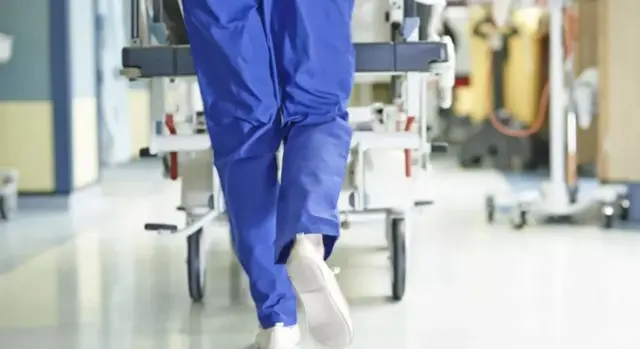 Image source, Getty
Image source, GettyThanks for joining us.
We're finishing up our live coverage on the winter pressures the NHS is facing in Kent, Sussex and Surrey.
We hope you have found our coverage from healthcare settings informative, including the exclusive behind the scenes with South East Coast Ambulance Service.
Remember you can find more coverage on our website about the NHS in Kent,Sussex and Surrey.
 Josie Hannett
Josie Hannett
Investigations Reporter, BBC South East
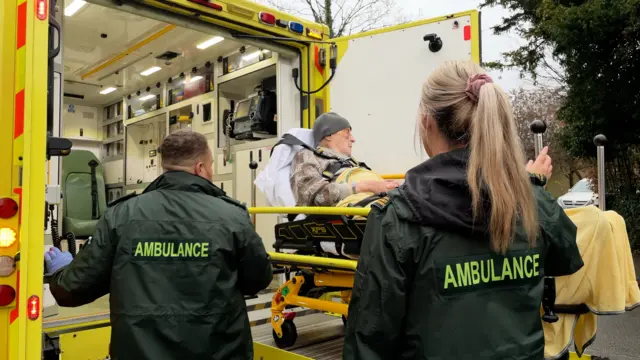
A day on the road with Secamb has been eye opening. The job is full on and by the end of the shift I felt exhausted.
It felt like there was no rest from one patient to the next, with just a 30 minute meal break during the day.
There were a couple of jobs which came through to us before being stood down, which made me question whether or not the person really required an ambulance and whether resources were having to be sent to the wrong people.
I asked Lee about it and this was his reply: “We’re coming up to the busy season of Christmas and we’d like people to be a little bit prepared for that.
"Simple things like speaking to your GP or going to an urgent treatment centre as alternatives to calling 999.
“It can be frustrating. We’re trying to get to people as quickly as we can and when there are alternatives to 999, that’s obviously prolonging our response to those who really need us.”
Meanwhile at East Surrey Hospital, we dropped off our final patient of the day, and as we arrived 96-year-old Christopher - who we’d dropped off eight hours earlier - was still waiting in the corridor of A&E.
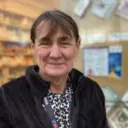 Jo Burn
Jo Burn
BBC Radio Kent, Hempstead
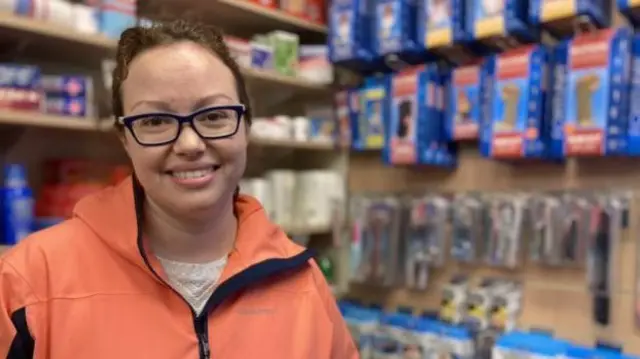 Image source, Jo Burn/BBC
Image source, Jo Burn/BBCIsabelle Flower has popped into the pharmacy here in Hempstead, Kent, for a check up for a skin condition.The young mum is putting it down to Christmas stress. She said: “I will get quick advice and I do trust them.“It’s nice to have someone to be able to reach a solution with.”
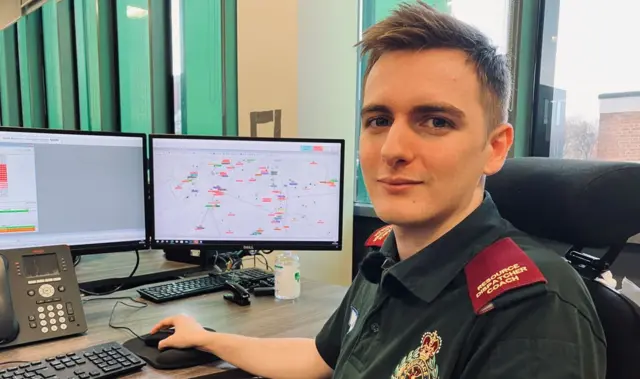
One of the many challenges for any ambulance service is ensuring that the most urgent jobs are attended to in the safest time.
And that is where James Trenerry comes in in his role as resource despatcher at South East Coast Ambulance Service.
He said: “We’re like the sat nav for the crew, telling them where to go and giving them all the information they need to assist the patient when they get there.
“Our triage system has a lot of safety nets to prioritise urgency.
“We’re making sure that we’re attending the highest priority jobs in the safest time we can with the resources we have available to us.”
 Lucinda Adam
Lucinda Adam
BBC South East Today reporter, Ticehurst
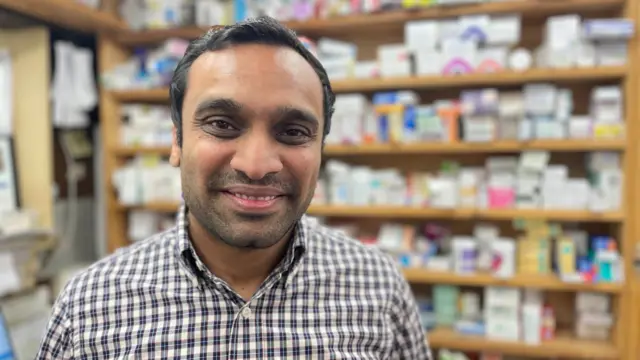
Hardik Desai, owner of Ticehurst Pharmacy in East Sussex, says he has already noticed more people listening to government advice to make their local pharmacist their first port of call.
He says he has had to recruit more staff to deal with the extra demand.
"We can see that changeover is happening.
"A lot of people are just coming to the pharmacy first and getting referred on if needed.
"It's getting busier and busier."
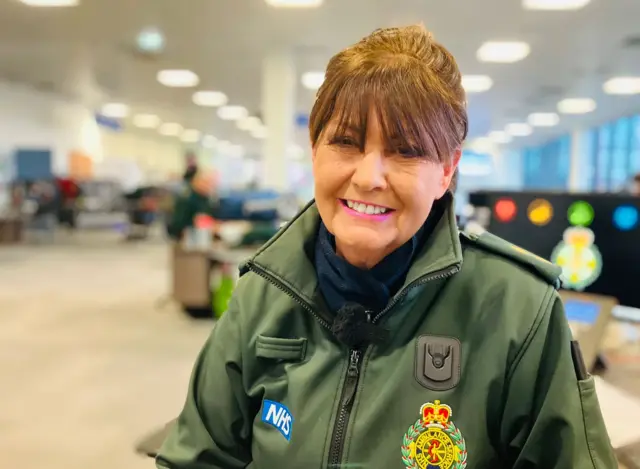
Ann Barnstable is team leader for the emergency medical advisors who answer the phones to the public for South East Coast Ambulance Service.
On a typical December day her team answers more than 1,000 calls.
She told us: “The impact is that we cannot get to patients quick enough. The more calls we get just means people have to wait more.
“A lot of people are not ringing up with life-threatening situations, which is what this service is all about.”
 Phil Harrison
Phil Harrison
BBC Radio Kent, Whitstable
Another extra service offered here at Estuary View Medical Centre in Whitstable is a cardiography department.
Becky McLaren believes “patients get treated sooner here because we’re all under the same roof".
She said: "Communication between the different areas of treatment is really good.”
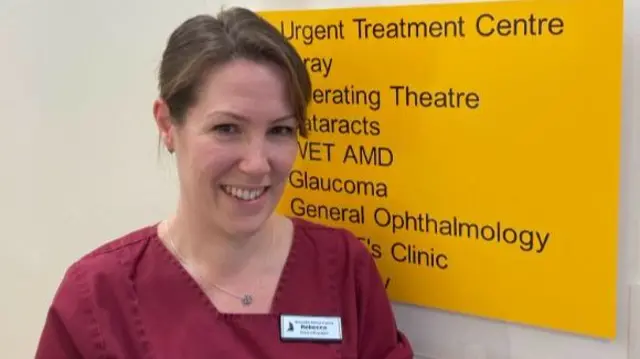 Image source, Phil Harrison/BBC
Image source, Phil Harrison/BBCLead Physiotherapist Gary Toner agrees.He said: “This is the future. The communication and relationships between staff here mean we can offer the best possible treatment to our patients.
"My waiting list is currently just two weeks which is thanks to the unique way we work.
"Health centres like this should be everywhere.”
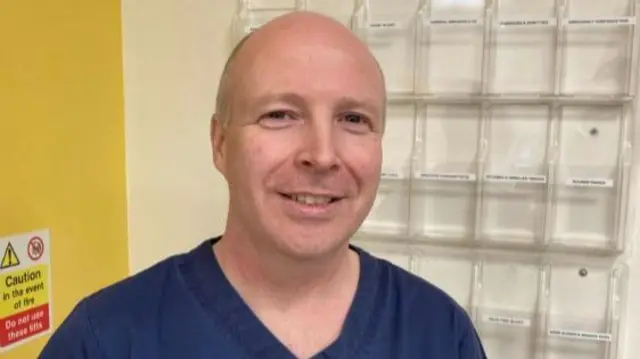 Image source, Phil Harrison/BBC
Image source, Phil Harrison/BBCA visit to Gatwick Airport was all in a day's work for paramedics.
They were called after a passenger collapsed while waiting for a train at the airport's railway station.
Man collapses and has a seizure at Gatwick Airport
 Jo Burn
Jo Burn
BBC Radio Kent, Hempstead
Susan Zerafa popped into Hempstead Pharmacy in Kent this morning to pick up her prescription on her morning dog walk with Obie. “I order my repeats online and it works really well. “My mum has dementia and she needed stockings and the girls here helped put them on. “They go over the top. I have never known a pharmacy like it."
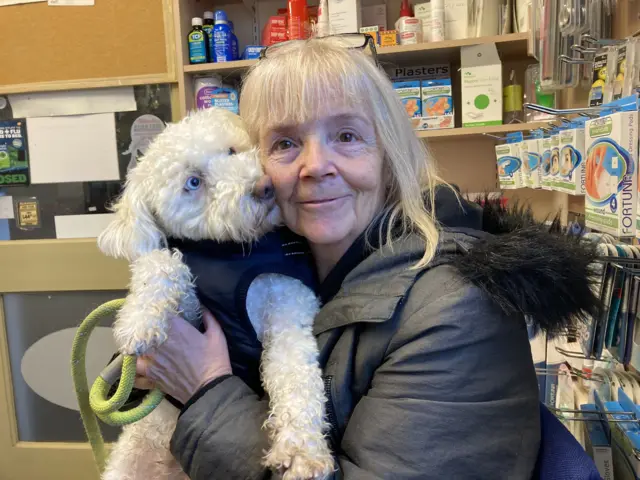
 Jacob Panons
Jacob Panons
BBC News, Crawley
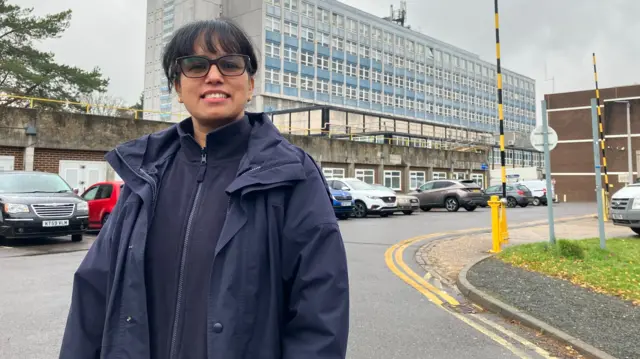
Clinical nurse lead Manglesh Kumari, who works in Crawley, has spoken to us about the rise in pressure this winter.
She said: “It [winter] brings all the infections, flus, and Covid now as well. I think with the staff and the patients we get a lot of sicknesses around that time of the year so how we manage is [by] working as a team and planning in advance.”
“It is a pressured time but I think our leadership and our management is quite good and they try to build a winter plan in place which really helps us all to lead it in a way that doesn’t really impact much," she added.
Ms Kumari said: "We know it is not always 100% but the standard of care and support we provide to our patients is phenomenal.”
In regards to the amount of pressure and patients the NHS is dealing with Mrs Kumari said she thought this year may see double what the system saw last year.
She said: “I am not 100% sure but I can feel that now coming that way.”
BBC South East spent the day on the road with an ambulance crew meeting patients around Gatwick and Redhill.
 Lucinda Adam
Lucinda Adam
BBC South East Today reporter, Lewes
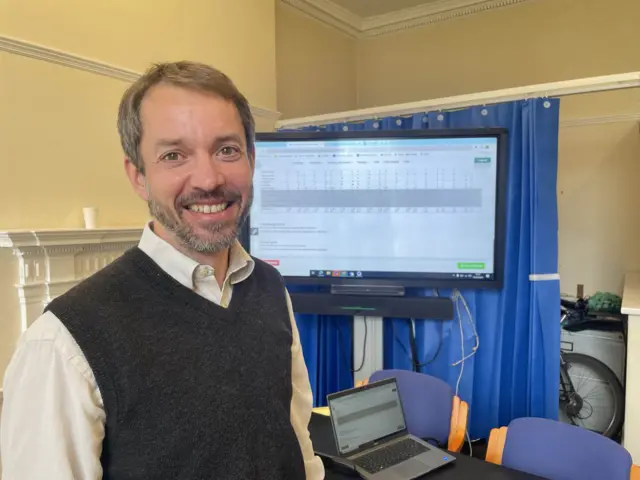
The Covid pandemic may be officially over, but the impact is still being felt, according to one GP.
Phil Wallek, clinical director of the Foundry Healthcare in Lewes, East Sussex, says waiting lists are still trying to recover.
"We've this perfect storm of all of that lost time, lots of people on waiting lists, people on those waiting lists are asking for more appointments with their GPs to help manage them in the interim period before they get the treatment they need.
"We've got all of that happening at the same time as all the usual respiratory illnesses."
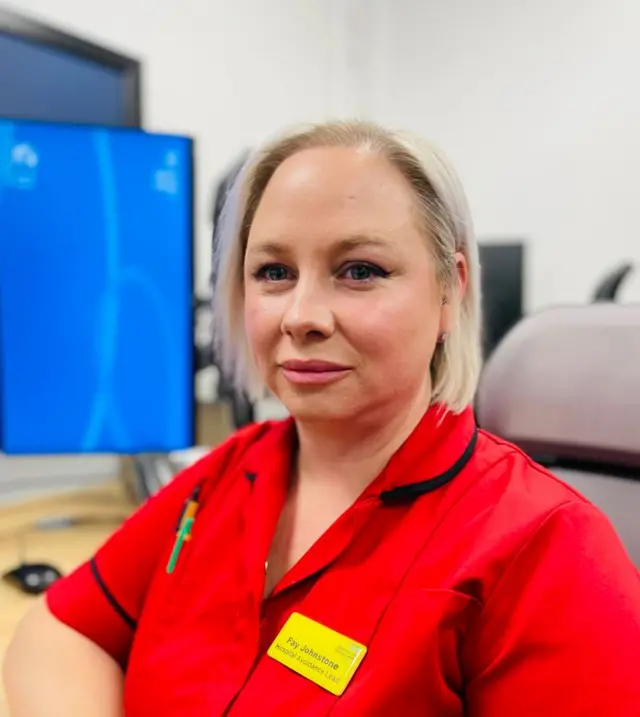
Fay Johnstone is a virtual ward matron at the Maidstone and Tunbridge Wells NHS Trust.
She leads the team which delivers acute care in a patient’s own home, and said: “We’ve got 24-hour nursing care.
“We use technology – either the patient’s own smartphone or we provide them with tablets.
“They get given a hospital in a box - to measure blood pressure, temperature and pulse.
“Nurses view their results and organise patient treatment. If patients deteriorate at home a 999 emergency is called."
The virtual ward system has been going for 12 months and has treated 360 patients so far.
Ms Johnstone said: “It’s not only about having hospital-level care at home, it’s about releasing the acute beds.
“A total of 2,800 bed days have been freed up back into the system.”
 Mark Norman
Mark Norman
Health Correspondent, BBC South East
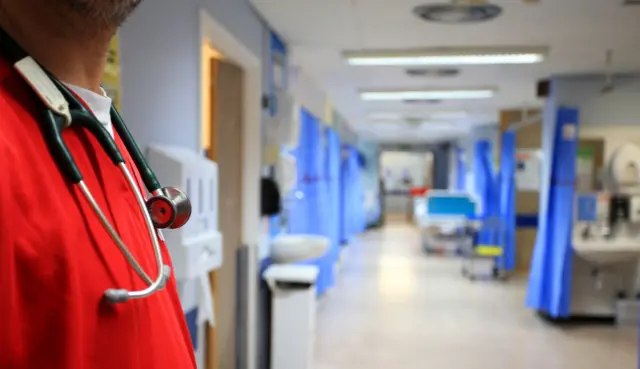 Image source, PA Media
Image source, PA MediaLet's state the obvious - A&Es are very busy.
But just saying very busy doesn't really cover it.
I've seen patients being cared for in corridors.
I've seen patients sharing individual patient bays.
And sometimes three patients are sharing one bay.
Ambulances are dropping off patients in A&E corridors.
Hours later the patient is still in the corridor and the ambulance crew is back with another patient.
All of this is extremely difficult for patients, their families and the staff trying to care for them.
Despite the apparent chaos and confusion in A&E the staff I spoke to are somehow coping.
They know it's not good enough but their doors never shut.
And for now this is how our A&Es are operating.
Patient calls for ambulance after two hours on floor
On a busy day for the South East Coast Ambulance paramedics, Lee Carr and Beth Sutton were called to assist a 96-year-old man with breathing problems and a woman, 76, who had a suspected broken arm.
Both patients were taken to hospital after receiving initial treatment in their homes.
Esther Dixon, who injured her arm after tripping in the kitchen, said she called for an ambulance after lying on the floor for two hours.
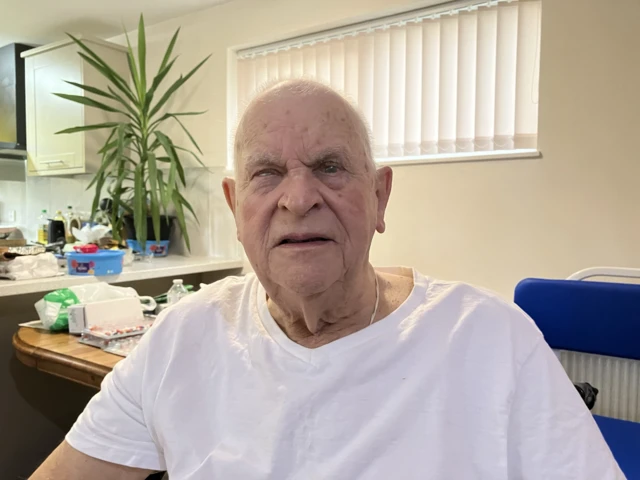
David Stanton, 82, needs to wear a head torch at home to see
David Stanton, 82, told us how much he appreciates the work of NHS staff and nurses, like clinical nurse lead Manglesh Kumar, who visit him at his home in Crawley.
He said: “I am grateful because they have sorted me out.”
“I have got no complaints about the NHS at all," he added.
David is disabled and nearly blind so needs to wear a head torch in his home to see.
He explained the benefits of being visited at his home.
Mr Stanton said: “I don’t like being in hospital. I am alright while I am initially there but I get bored because I can’t get around, I am sitting there on my chair.
“I don’t feel so vulnerable [at home]. I basically know where I am. I can’t see that much but at least I feel secure."
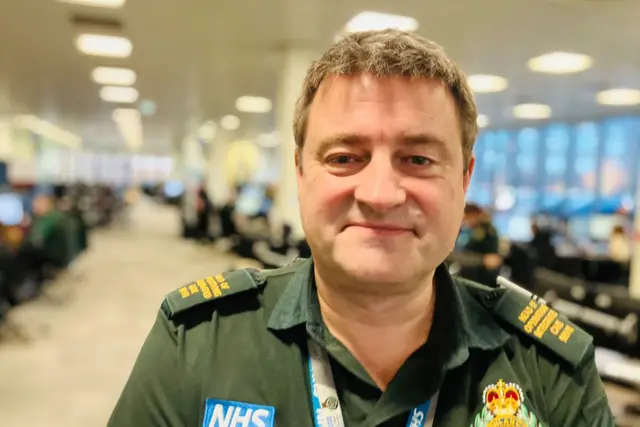
The NHS faces increased demand in the coming days as Christmas and New Year is predicted to lead to a sharp spike in calls.
Simon Clarke, head of integrated urgent care for Secamb’s 999 and 111 service, said: “We’re expecting around 90,000 calls to our 999 service in December.
“About 40,000 on average we would send out an emergency response to, which would get on average around a 17-18 minute response time.
“That’s why it’s so important that calls that are not life-threatening are made to 111 rather than the 999 service – especially at this time of year.”
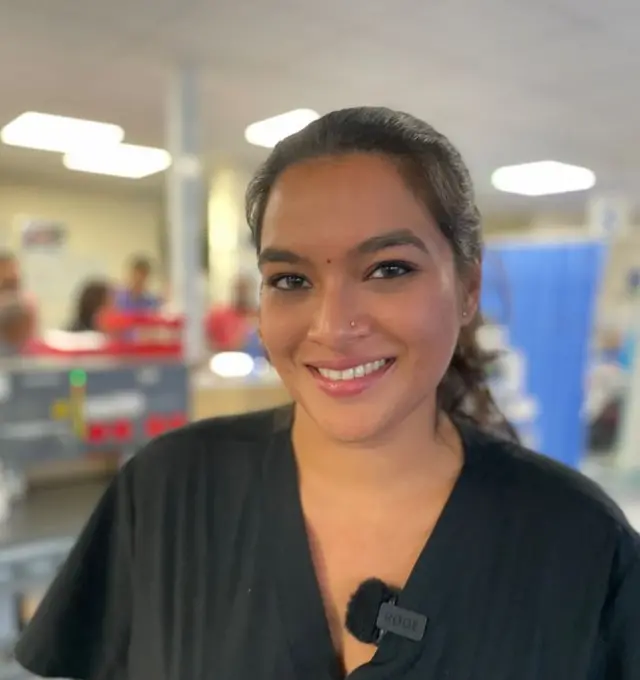
The winter months bring unique challenges to NHS hospitals such as Maidstone Hospital.
No-one is more familiar with those challenges than Dr Roshin Sudesh, a consultant in emergency medicine at Maidstone Hospital.
She said: “Winter means you get more respiratory illnesses, flu, bronchitis.
“Because we know winter is going to be busy we plan ahead.
“We aim for same day emergency care, where patients come in, have their treatment and go home.
“We wouldn’t ever turn anyone away. But we ask that the public are aware of the pressures we are under and if they can seek help elsewhere then that would be helpful.
“A&E consultants, as a bunch, take each day as it comes. As long as we can keep our patients safe we’re happy.”
It’s 8.29am and the phone lines at the Princes Park Health Centre, Eastbourne, are about to open. BBC Radio Sussex spent the morning with staff and patients